![]()
The Charlotte News
Tuesday, November 29, 1938
SIX EDITORIALS
![]()
![]()
Site Ed. Note: As to the 1939 Rose Bowl game on New Year's Day to come out in Pasadena, as mentioned below, Duke would lose 7-3, to the Trojans of U.S.C.
In attendance, if memory properly serves, upon their meeting at the game, was? Well, you guess it.
May explain a lot, with other things, as to why these editorials, in this period of time, seem, when read differently from that which was intended, to explain a lot about later events.
That year, incidentally, 1938, U.N.C., on October 29, captained by Steve Maronic and George Watson, lost to Duke, 14-zip.
But again, that Thursday, a few minutes later, in 1963, the score was 16-14, and by it, after that recovered onsides kick, to kick the winning field goal, went on to the Gator, beating the Air Force 35-0, the first trip to a bowl for U.N.C. since '49, when they lost to Rice, in the Cotton Bowl, in Dallas, Texas, 27-13.
After the game in Jacksonville, that year, December 28, the Hotel Roosevelt burned down, killing several people.
All of which goes to show that sometimes, when played by some too much for keeps, football can be a very dangerous sport.
Especially, when the linemen drop back unexpectedly, away from protection of the team Captain and quarterback, just at a critical moment, right after the left side lineman has strangely looked to his right suddenly, and, oddly, then sheepishly looked down, as demonstrated by the replay.
So the moral is that when some playing too much for keeps so play, trying to re-arrange their Olde Deal, they may get caught like deer in the headlights, and a severe penalty called against them, even if later, years afterward.
And once, anon, on a crisp autumn day, October 12, 1961, the anniversary of the founding of this first state university, U.N.C., the students gathered in old Kenan Stadium there, beside the Kenan Bell Tower, a fine new addition to the campus in this year of 1938, amid the pines, and listened to a man from New England address them. Those who were there, they say, have never forgotten it.
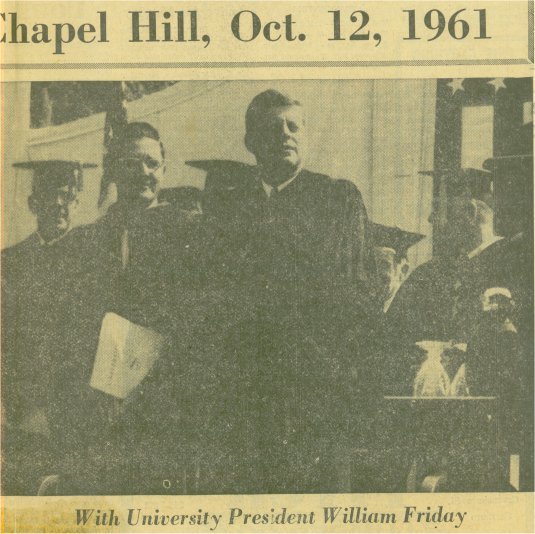
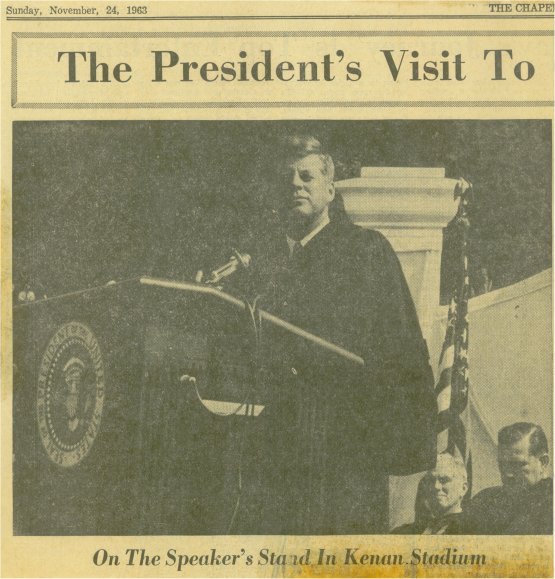
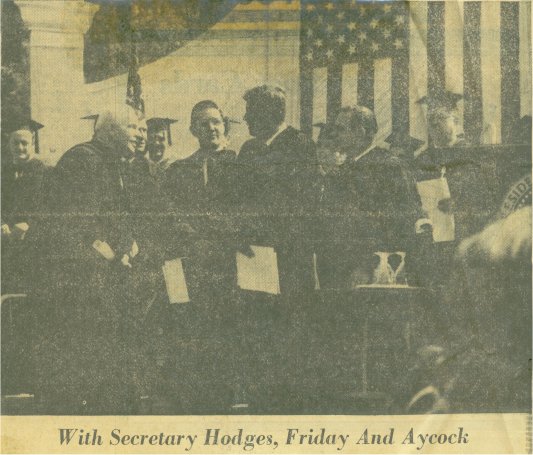
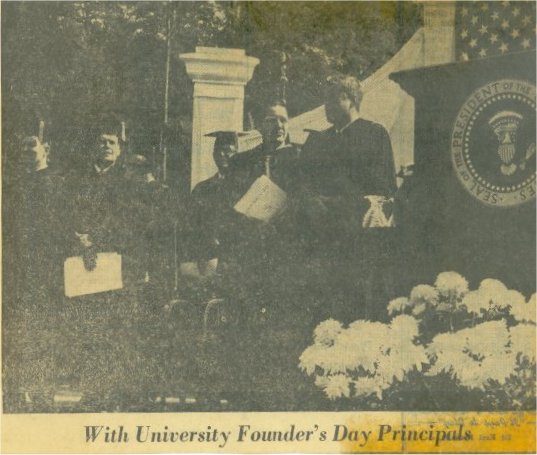
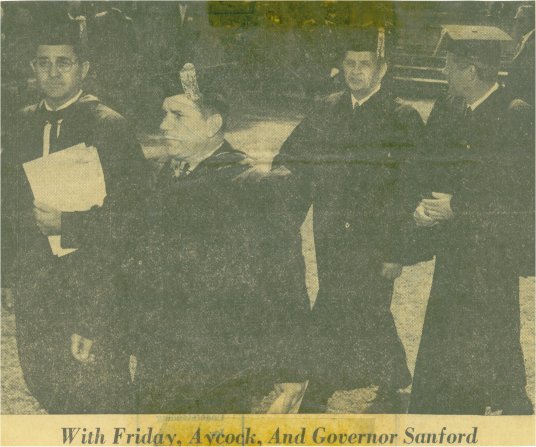
The persons referred to, other than the President and Governor, are Secretary of Commerce, Luther Hodges, former N.C. Governor, preceding Sanford, President of the University at the time, William C. Friday, and Chancellor William Aycock, in 1966 to return to his duties as law professor at the U.N.C. Law School, a pretty fair teacher of Federal Jurisdiction, if we recall, (to be succeeded as Chancellor by J. Carlisle Sitterson, a pretty fair teacher of history of the New Deal and what not, if we recall); photographs from The Chapel Weekly, November 24, 1963
And sometimes, when you have been away from it for awhile, way out West somewhere, if you get there just at the proper time, as you stroll down by old Mangum Dormitory to remember a few times past, that Bell Tower will play for you, unto this day, "Shenandoah".
![]()
Our Proper Exhibits
Our previews of the New York World's Fair have revealed a smooth and enormous layout of chromium, steel and glass, and facades of sleek buildings that seem moulded for the same lines of speed as this year's new automobiles. There are to be revolving cocktail bars glittering with precious glass like the Stork Club, revues with streamlined girls, miraculous towers and speedways, all architectured in the design of the new era.
North Carolina will have an exhibit in this Long Island Bagdad, and June 19 will be North Carolina Day. We can, of course, reaching into our resources of commerce, bright textiles, high-geared machinery, make up an exhibit that will be as sleek and modern as anybody's and we'll do it. But North Carolina Day--that's something else.
We suggest that in honor of the occasion the fair-grounds be divided into counties, 27 of them to serve likker, the others to remain dry. We suggest that somebody get on a loudspeaker and intone, all day long, "The proper pronunciation of North Carolina is North Carolina--not No'th Ca'lina." At the other end of the fair, another speaker will shout: "How are you all? And I do mean you all--all of you. It's plural, it's plural, it's plural."
But the best exhibit of all should be one to which we'd like to give our personal attention. We'd like to get up a booth somewhere presenting the virtues of good old North Carolina calomel, red flannels and predestined hell-fire.
![]()
Much More Note: And, come to think of it, all that talk about "steel and glass" and so on and so forth, and..., and "No'th Ca'lina" reminds us, for our neophyte readers here, (or for the more experienced, if you've forgotten some of it by now), to give you a little shortcut to some other stuff, of similar notes, it being somehow getting profounder and profounder as time passes slowly, up here in the mountains, just so you won't have necessarily to spend years trying to figure all this stuff out, as we may not have that much time, now that we've all been so slothful for decades already, maybe for good cause during the first few years of it, though in hindsight one would have to say that secrecy is, for the most part, in an open and democratic society, a very dangerous thing, which can, if after a war is won and over, allow a bunch of damned to hell Nazis and Nazi-symapthizers, or the functional equivalent thereof, to get a foothold with their little secret codes, winky nods and such, and get you, before you know it, so brainwashed that you really don't know anymore what is important and what is trivial and specious. But we'll not lapse into too much of that kind of didactic dialectic right now, for we haven't time, as we said, with that cap melting at an arithmetic pace and a brand-new hurricane season just around the corner, six months or so from now. So just go here and here, here, and maybe here, also, not to mention here, and here, and cogitate on all that a little bit, walls and bridges, the "Note", and maybe that above link to "Death", even too, (if you're brave enough), even, "1", "2", and "3", and such, and see what you see.
If you don't see it, well, we'll just have to have you sit the next little while out there, on the bench awhile, maybe, Pilgrim, until you get it, for we can't really afford to have you a-muckin' everything up until none of us can breathe anymore and the cap is gone completely. For if you don't see it, you've no business asking, ordering, or beseeching anyone to do much of anything at anytime; you're doing well to govern yourself and your own life and so ye might as well mind your own business, as Cash told you to do back there in Shelby in 1928. For you are blind as a vampyre bat, and they're pretty blind, though plenty of near-sighted, far-sighted, and sightless humans, just like King Lear, may see how this world a' times goes. And, again, while we hate to keep belaboring this point, next time anyone out there wants to code some trash--be you a Ni-yonian, a Sovereign Sycophant, or an oil magnate, Plumber, or tobacco confederate, or some other specious variety of plant--some murder, or some assassination, some break-in, or some other egregious, nefarious behavior, you best not mess with Nanny Cashie, or for that matter anybody whoever talked to her or heard of her or read about her with any close discernment and sensitivity, and understanding of the rhythms and rhymes--or anyone like her, for that matter, such as a Rose by any other name, for you could wind up in a cold dark place for eternity, whether caught at once or later, in those steel traps--and later is coming up fast from your rearview mirror, now, you weaving, murderous Joker--amid all that Bosch. For we shall just tell you that when you get all those genes a-pounding inside your head, those Scotch-Irish and German, and Lord only knows from whence else, maybe some Dutch in there and English, French, maybe Mediterranean, and maybe some of t'others too, all at once, well you just can't help but be a canary a-singin', in the cage or out. Zippety-do-dah...Zippety... And besides, we have friends in High Places, then, now and again.
Also, beware tricking people born on Twelfth Night, for you may be, sometime, quite without realizing it, reading the writings, or listening to the singing, or, even going there again, hearing the speeches, of one of them. They're fierce people, Pilgrim--whether from Minnesota, California, North Carolina, or elsewhar.
And, furthermore, before we forget it, the flipside of those first two photographs above had a very poignant note from a fellow named John Clayton, a drama critic for The Chapel Hill Weekly. He had just finished reviewing the Carolina Playmakers performance of Eugene O'Neil's Long Day's Journey Into Night, then playing, in old Gerard Hall--where once, they say, Andrew Johnson spoke to the students--November 19-24, though we are fairly certain that the latter three performances were cancelled. He had written his review before the terrible news there on Friday, and so he added, as postscript, the following:
At the risk of being trivial, it was as though I had been kneeling to contemplate a bruised flower when beside me a mighty oak was uprooted and blasted to the ground. When I turned back to look at what had held me so intently, I was embarrassed. Yet I know that pitiful though it may be, it is my garden to cultivate and I will return there without shame. For it seems to me, in this strange and disappointing world we live in, that until we learn to suffer for the bruise, we must endure the blast.
"I did a very cruel thing once," said the priest in Shaw's Saint Joan, "because I did not know what cruelty was like." To which the Bishop replied, "Must then a Christ perish in torment in every age to save those that have no imagination?"
It is indeed the question.
![]()
![]()
The New Armada
The staggering rate at which the navies of the great powers are being expanded is revealed by a series of tables based on official information, which the Intelligence Division, Office of Naval Operations, has just published. The figures as of July 1, 1937, were these:
Great Britain ...................... 1,216,398 tons
United States ...................... 1,083,230 "
France ................................. 469,045 "
Italy ..................................... 396,683 "
Germany ............................. 147,632 "
Japan ............................(ca.) 800,000 "
But mark now how these figures are dwarfed by the new ones, as of November 15, 1938:
Great Britain ....................... 2,133,648 tons
United States ....................... 1,618,085 "
France .................................. 793,959 "
Italy and Germany combined 1,253,033 "
Japan .................................... Unknown
Between them the four European powers and the United States have 1,821,470 tons of ships--including 25 capital ships--presently building. The whole bill for current construction is estimated to be in the vicinity of two billion dollars. As against the Fascist powers in Europe, the democratic nations, England, France and the United States, have a tonnage superiority of three to one. And as against the Fascist bloc and Japan combined, the superiority is still probably about two to one. Moreover, there is little prospect for the Fascist-Japanese combination ever catching up, now that England and the United States have turned to building at top speed.
![]()
They Earned It
Old Buck Duke, God rest his soul, would have been pleased beyond his usual pink. Old Buck was the exponent of doing, come hail, high water or Pittsburgh, what you set out to do, and doing it by the shortest possible method. Duke University has done just that. As time is measured from the Endowment, only thirteen short years have passed, and here is the University that stemmed straight from Old Buck with certainly the outstanding football record in the country and the choicest of all post-seasonal invitations--to the Rose Bowl.
As far as the University administration is concerned, it is a logical, almost a routine triumph. You get yourself a Rose Bowl coach. You arrange a schedule that is calculated to bring you into national prominence. You play your games and bide your time and--tinkle-tinkle--its California on the line.
But as for the 1938 football team, the climactic epilogue to a season of hard play is earned recognition of a series of superlative performances. Football may, as the sport's purists contend, be dreadfully overemphasized in its collegiate importance, but deeds of valor and stark fortitude and derring do will always command admiration. For the exhibition of those qualities on last Saturday alone, the Duke team deserves immortal status.
![]()
The Forgotten Man
It was Mr. Grant Lowe, national organizer for the Townsend Recovery Plan, speaking--at the Mecklenburg County Courthouse last night. The country, said Mr. Lowe, is in a bad way. We are under "political bondage." All the publications in the land save 38, the great broadcasting chains, all but one group of the chain stores, the banks, "practically everything," are under the control of one man--Mr. J. P. Morgan. And the only way out is the Townsend Plan, which will turn loose, says Mr. Lowe, $4,000,000 a month in Mecklenburg.
Ah, well, we hope that, when it comes, we get cut in for our share of that 4,000,000 smackers. But meantime we are delighted to find that old man Morgan is still around. We had nearly forgotten him. His sire, old J.P. pere, we remember having read in our history books, used to be a dreadful fellow back in the days of Populism and Bill Bryan. Come, to think of it, the old man owned everything then, too. But as for J.P., fils,--ah, yes, we do remember that we heard along in the 1920s that it was he who got us into war (or was J.P. pere still living then?) and got 50,000 Americans killed in battle, in order to save the loans he had made to England and France. And there was something about his dandling a dwarf on his knee in the Senate sometime ago. But for the main we had really forgotten him. And all the time, he was sitting out there in his web, spinning away, "thwarting Mr. Roosevelt," (Mr. Lowe said that, too) and still, like his old papa, owning everything. Whatta man! Whatta man!
But stay! It occurs to us that The Charlotte News itself may not be one of the 38 publications he doesn't own. We should look into that, pronto.
![]()
![]()
Site Ed. Note: Harts and roes and Pepsi Cola.
![]()
Coker of Hartsville
Around Hartsville, S. C., cotton of such an extraordinary grade and staple length is grown that it brings a premium of 5, 6, 7 cents a pound. Elsewhere in the South generally, many of the more alert farmers have shifted from ordinary to pedigreed cotton seed, and put money in the bank as a result. The benefactor of Hartsville and the purveyor of the seed was David R. Coker, who died yesterday.
Sometimes it happens that a man will have an extraordinary scientific bent, which in Mr. Coker took the form of horticultural genius. Sometimes it happens that a man will have both the desire and the ability to serve his fellow men by helping them to help themselves. But it is rare indeed that all these qualities are found in a single individual. When accompanied by a charming personality and noble attributes of mind and manner, the sum is as exceptional as was the South's premier horticulturalist, David R. Coker of Hartsville.
![]()
True to Form
The French are apparently beginning to react to M. Daladier's policies very much as those familiar with their history and temperament might have prophesied. Of all peoples on earth, the French are probably the most jealous of their civil liberties, both because they are naturally restive and impatient of authoritarianism--and because even since the first French Revolution, they have had to fight almost continually to preserve them from the encroachments of those under the influence of the older European idea of one-man power.
The advisability of a one-day general strike may be questioned, but the right of a free people to pull it can hardly be. If it were to be prolonged--yes. Under those circumstances M. Daladier or any other head of a government might be justifying using the army to see that the country was not paralyzed, though even then he would hardly have the right to force the regular employees to work by the trick of calling them into the army and assigning them to their old post under penalty of court-martial. But a 24-hour strike is not going to damage anything seriously and indeed has as its only purpose the registering of political protest against M. Daladier's policies. And when he attempts to force labor in order to prevent such a protest, he places himself in the same category with such dictators as Hitler and Mussolini.
And draws an issue in which he seems likely to lose. In the beginning, many of the labor unions, apparently doubting the wisdom of the strike, were inclined to hang back. But now that they see the attempt at open coercion being made, they are unanimously lining up for the strike.
![]()
Framed Edition
Links-Date -- Links-Subj.